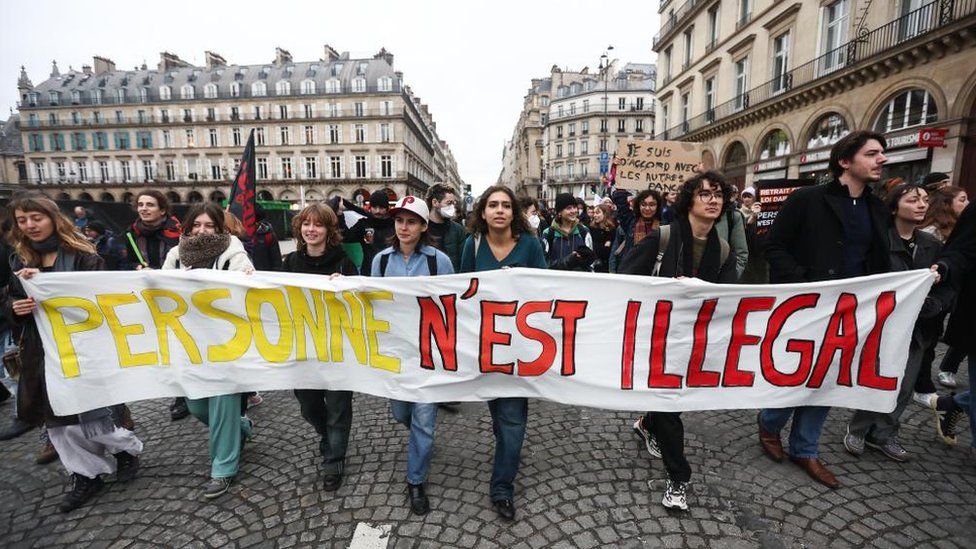France set to tighten immigration law after court scraps some measures
- Published

The French government says it will push through a controversial immigration law "in the coming hours", despite many of the measures being struck out as invalid.
Most of the 35 measures rejected by France's nine-member Constitutional Council were added to the bill because of right-wing and far-right pressure.
But the new law still represents a hardening of the immigration rules.
Foreigners legally in France could now be deported with criminal convictions.
Even those who came to France before they were 13 or those who have lived in France for more than 20 years could be expelled if they are given substantial jail terms and deemed to be a "grave threat to public order".
Interior Minister Gérald Darmanin said the Constitutional Council had validated all the government's measures and it was now time to put the law into practice.
"The Republic will never have had a law as tough as this," he told France's TF1 TV channel on Thursday night.
Details on enforcing the law would be handed out on Friday, he said, and as of February or March every French prefect would have to put together their files to decide which offenders should be expelled.
However, the law also includes measures that prevent authorities from placing under-18s in detention centres and gives prefects the power to hand one-year residence permits to people with no papers who work in jobs such as construction, which are known to be facing labour shortages.
Friday's ruling coincided with latest migration figures from France's interior ministry showing the number of foreign offenders expelled from France in 2023 had risen by 10.7% in 2023 to more than 17,000, although well down on the numbers before the Covid crisis.
Asylum applications increased by 8.6% last year to almost 142,500, but at a slower rate than the year before.
With European Parliament elections ahead in June, and without a majority in the National Assembly, President Emmanuel Macron is facing a strong challenge from the far right and he is reliant on parties outside the government to get legislation through.
It was only five weeks ago that the government managed to push through its immigration law, with the backing of right-wing Republicans and the far-right National Rally (RN).
Left-wing parties accused the president's centrist Renaissance party of enabling the far right and betraying their own convictions, while some Renaissance MPs refused to back the proposals.
In order to get the bill through, the government accepted a series of amendments on top of the measures already proposed, such as limiting family reunifications and reducing access to welfare.
It was largely those amendments that were thrown out by the nine "sages" who make up France's top constitutional authority on Thursday evening, to the anger of the Republicans and the RN.
Government figures hailed the Constitutional Council's ruling as a victory, as the original measures that ministers had initially failed to get past MPs were intact. "We have all the resources we need," Mr Darmanin said.
The president of the RN, Jordan Bardella, complained of a "coup by the judges, with the backing of the president of the Republic himself", while Republicans leader Eric Ciotti said it appeared that constitutional reform was more vital than ever "to safeguard France's destiny".
Commentators pointed out that the sages had scrapped the added measures because they were seen as not sufficiently linked to the initial legislation, not because of their substance.
The French right is now pressing for a second immigration bill to be put forward, although the interior minister has made clear he has no intention of doing so.
Related Topics
- Published20 December 2023